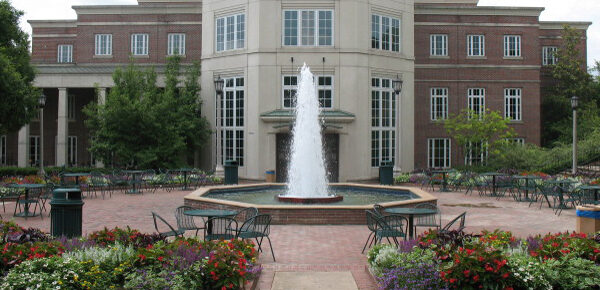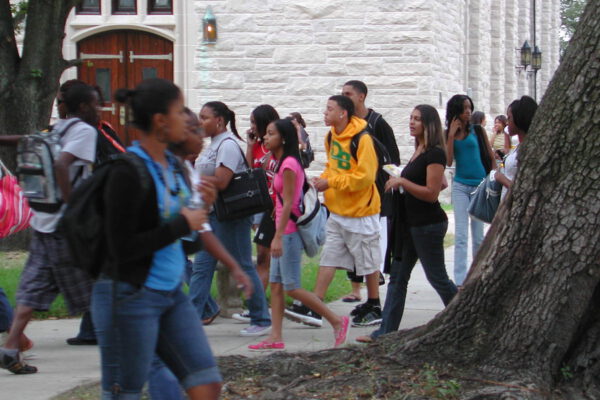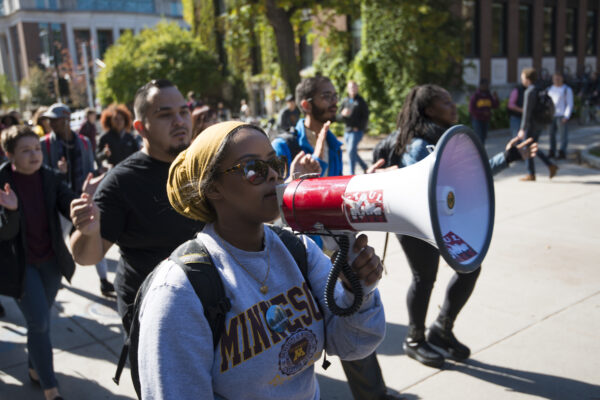By John J. DeGioia
This post is part of ACE’s work on free speech and campus inclusion made possible through generous support from the John S. and James L. Knight Foundation. In the wake of President Trump’s recent executive order on campus free speech, it is a timely review of higher education’s commitment to the First Amendment and the mutually inclusive nature of free expression and inclusion.
Our nation’s colleges and universities share a core set of commitments: the education of our young people, the inquiry of our faculty, and the common good of our communities.
We meet these commitments through practices of freedom—freedom of speech, academic freedom, and the exercise of shared governance. Each brings its own tensions and challenges, but together, they are integral to our responsibilities as academic institutions. In fact, they distinguish the university from other institutions in our society.
Freedom of speech
Consistent with the spirit of the First Amendment, members of our academic communities are free to express their thoughts and opinions without fear of restraint (subject, of course, to reasonable restrictions of time, place, and manner).
For our public institutions, state law typically requires this commitment. Private institutions have more flexibility in the implementation of this practice, but upholding this commitment is shared throughout higher education.
But our commitment to speech and expression is increasingly complex and can no longer be taken for granted. The following are a few examples of this complexity and the tensions that arise:
- We are responsible for multiple spaces and places, including indoor and outdoor spaces, public halls and auditoriums, and private offices and residences. We also engage with a very new space—social media.
- Our communities include both transient and permanent members.
- We have a multifaceted and multidimensional purpose: for example, we seek to educate students in what is known and to encourage the exploration of the unknown. We study established knowledge and pursue the frontiers of knowledge.
- For many campuses, students are in residence—our campuses are our students’ homes.
- We are no longer an ivory tower. The combined effects of technology, globalization, and neoliberalism mean that we are fully immersed in the real world.
- We are responsible for navigating the phenomenon of “identities.” No other institution engages the questions of our differences and diversity as does a college or university.

And perhaps the most important tension: our students do not necessarily view this commitment to free speech and expression in traditional ways. Research indicates that students throughout our country have articulated a more nuanced position—one that is seeking a balance between free speech and inclusion.
When asked in a 2017 Knight Foundation/Gallup survey to choose between free speech and inclusion, slightly more students (53 percent) valued inclusion over free speech (46 percent). They see the position held by many of their elders as uncompromising—and the survey questions that demand an either/or answer reflect that.
We must listen to the voices of our students. Can we find a way to protect free speech while recognizing the value students place on diversity, belonging, and inclusion? This value should always be part of our thinking when we refer to free speech and expression.
At the same time, freedom of speech alone is not enough. Freedom of speech may be a prerequisite for our work, but it is not a guarantor of truth. We look to our universities for truth, and it is a second practice—the practice of academic freedom—that is needed.
Academic freedom
Inquiry—our commitment to scholarship and to research—is a defining characteristic of the university.
The conception of the modern university began to emerge in Berlin in the nineteenth century, as these institutions became the locus of what Chad Wellmon described as “epistemic authority” in his 2015 book Organizing Enlightenment.
For Wellmon, the university came to “stand . . . not just for a repository of knowledge but rather for a community of knowledge that provided authority structures for how to think.” In the American context, this development is captured in the establishment of the graduate school and PhD at Johns Hopkins University in 1876.
Academic freedom provides the condition that enables us to establish authority—the authority of knowledge. What do we know? How much confidence do we have in what we know? Where do we have doubts and uncertainties? Can we accommodate the changes that new knowledge reveals? This work takes place within epistemic communities—the disciplines—that provide the structures for the work of inquiry.
Our commitment to academic freedom assumes a respect for expertise and the epistemic authority that comes with immersion in the disciplines. According to John O’Malley in Four Cultures of the West, this “analytical questing and questioning” constitutes the academic mission of our institutions. Through this “style of learning and discoursing,” we call what we create and construct, discover and reveal, the truth.
Shared covernance
There is a third practice that is inextricably linked to freedom of speech and academic freedom: shared governance. Derek Bok describes it in Higher Education in America as the four constituents of the college or university—trustees, academic leaders, faculty, students—each having a role in governance and, “all of the parties with an interest in the work of universities have at least some opportunity to make their feelings known and have a tangible impact.”
We are able to do our best work when we recognize and listen to the insights, perspectives, needs, and desires of the members of our community: when we sustain these three practices—freedom of expression, academic freedom, and shared governance.
If you have any questions or comments about this blog post, please contact us.


